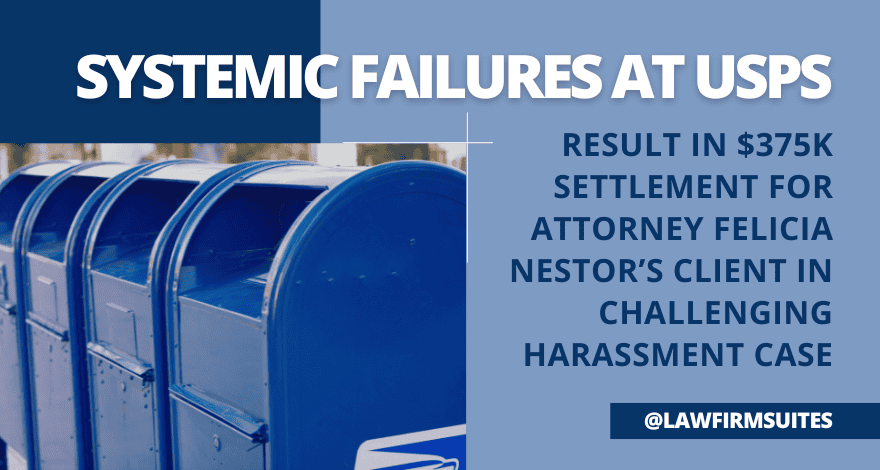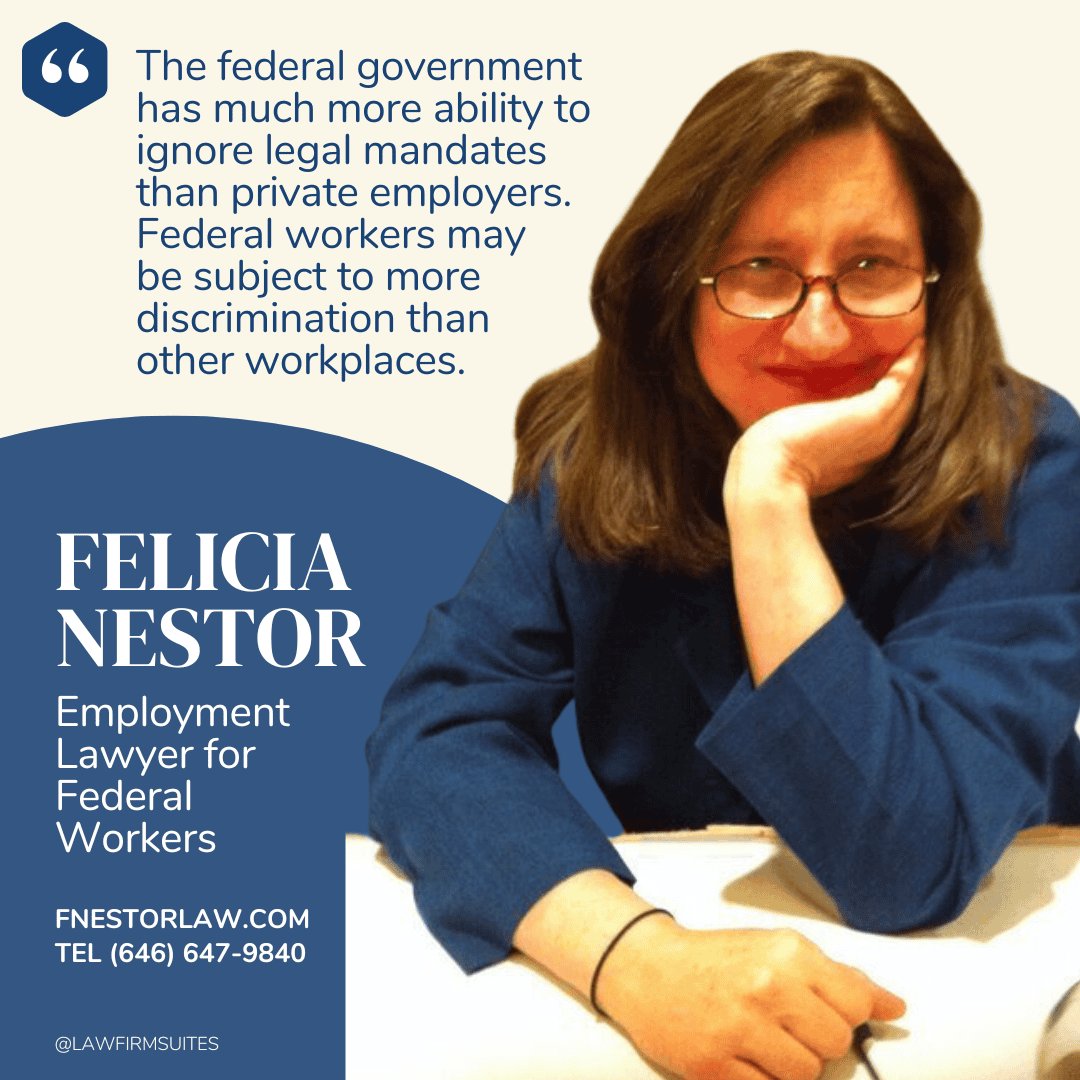New York employment lawyer, Felicia Nestor, gets client a $375K settlement after an epic seven-year battle against the US Postal Service in a challenging sexual harassment and retaliatory termination case.
This article was part of a series featuring “Big Wins” for some of Law Firm Suites members that included a harrowing tale about the international abduction of kids, a piece about a Russian couple who got a fresh start in the U.S. after being persecuted for their anti-war beliefs and this story.
Few cases are as emotionally taxing and morally significant as those involving sexual harassment, especially when the defendant is an agency of the United States government.
For Felicia Nestor, a seasoned plaintiff’s employment lawyer who passionately advocates for Federal employees in discrimination and harassment matters, one particular case against the United States Postal Service (USPS) stands out.
After seven years of legal maneuvering and advocacy, Nestor recently obtained a $375,000 settlement for a former USPS employee who was wrongfully terminated after being sexually harassed by a predatory supervisor.
Nestor’s client, a single mother and entry-level employee, showed immense courage in challenging the toxic culture of silence and fear that allowed her abuser to thrive.
Grooming and Intimidation
This case sheds light on the dark reality faced by many employees who suffer in silence with sexual harassment due to their fear of retaliation.
The supervisor, who was a 30-year employee of the USPS, employed insidious tactics, including grooming and manipulation, to exploit his position of power and prey upon Nestor’s client. “He knew she was desperate to keep the job,” says Nestor, and the supervisor exploited the situation.
The supervisor routinely touched the employee, asked to date her, and scheduled her for shifts when fewer employers were around, making it easier for him to harass Nestor’s client. On one Sunday when few other employees were onsite, the supervisor took Nestor’s employee to a secluded part of the building where he cornered, grabbed and tried to kiss her.
The harassment also involved threats of violence. “She was afraid of him,” says Nestor. “He had made violent threats involving guns, and would tell her ‘you’re a single black mother, nobody’s gonna believe you, I’ve been working for this agency for close to 30 years’.”
Fear of Retribution
Nestor’s client initially hesitated to speak out, fearing retribution, which was warranted. The employee was terminated for specious reasons a mere day prior to her first anniversary, when she would have qualified for union representation and heightened job protection.
According to Nestor, the supervisor and another employee who was loyal to him colluded to terminate her client. “They cooked up some false accusations that she was fighting with another employee and they fired her,” says Nestor.
Following her termination, Nestor’s client reported the harassment via a complaint with the Equal Employment Opportunity Commission (EEOC) and the USPS started internal investigations. Fearing for her life, she also moved her family to a different city to get away from the supervisor. “She slept on her sister’s couch for a number of months because she was terrified that this guy was going to come after her,” says Nestor.
 Institutional Betrayal & Systemic Failure at the USPS
Institutional Betrayal & Systemic Failure at the USPS
The extent of the abuse in this case, and the systemic failure within USPS to address it, was reprehensible.
According to Nestor, the USPS knew that the supervisor was a serial sexual harasser even prior to Nestor’s client being hired. “The agency wanted to fire this guy,” says Nestor. “But none of the other sexual harassment victims had the guts to continue prosecuting him.”
“The USPS had an obligation to ensure the Supervisor was not doing anything illegal, and it should have told other people in that facility to report any suspicious activity,” says Nestor.
But USPS didn’t do that and, according to Nestor, the agency just let her client be sexually harassed.
The USPS wanted to use the client’s EEOC complaint as grounds to fire the supervisor, but if they admitted the harassment, they could be liable to her for serious damages. “So what the USPS wanted to do was appear to take prompt action as soon as they knew of the harassment and not be held liable,” says Nestor.
According to Nestor, the USPS wanted to prove that her client was correct about the sexual harassment, but they had no idea whatsoever about it. The USPS wanted to show they did everything in their power to ensure a safe workplace once Nestor’s client reported the harassment, including firing the supervisor. “But completely separate and apart from that, the USPS was building a case that she was not a good employee,” says Nestor.
The supervisor appealed his termination and Nestor’s client was the primary witness against him. The supervisor lost his appeal and, in a 40-page opinion, the veracity of the client’s allegations were vindicated by the Judge. According to Nestor, “the judge believed my client to be credible on every single point.”
USPS’s Weak Settlement Offer Denied
Following the appeal and the termination of the supervisor based on her client’s testimony, Nestor believed that the USPS would be forced to make a reasonable settlement offer on the EEOC complaint, but they did not.
“They offered $75,000,” says Nestor. “But at this point, my client had been out of work for years because she was fired by the USPS and had difficulty finding a good job with that on her resume.” So Nestor’s client declined the settlement offer and continued on with the case.
A Great Mediator Gets the Case to the Finish Line
Nestor was able to accumulate good corroborative evidence that her client was not a bad employee, notwithstanding her coworkers’ reluctance to assist. According to Nestor, the other employees in the facility acknowledged that her client was a good employee, but they were angry with her because they assumed her client was hanging out in the Supervisor’s office everyday to avoid her duties. “But she was there because she was feeling pressured [by the Supervisor] and afraid,” says Nestor.
Following a five-day EEOC liability hearing, an administrative judge eventually found the USPS liable for sexual harassment and retaliatory termination, forcing a hearing to determine the degree of damages.
Nestor felt the case could be successful in a damages hearing, but she aggressively pursued a favorable settlement. “Basically, what the agency told me was that they would appeal every single decision that was made in this case,” says Nestor. “I think we could have won but it would have been so risky for my client and she had already been living this nightmare for 10 years.”
With the help of a mediator brought in by the USPS and after seven grueling years of litigation, Nestor’s client agreed to settle the case for $375,000.
Why did This Case Seven Years to Get Resolved?
According to Nestor, the mediator in this case advised her that mediations for discrimination cases with private employers take one to two days. Nestor’s case took six months, which is not uncommon.
“The federal government doesn’t have to pay its attorneys by the hour and they are paid no matter how long a case can take,” says Nestor. A private employer would think carefully about the value of paying counsel to pursue long-shot defenses or specious appeals.
“The federal government doesn’t have to be concerned about this at all,” says Nestor. “Their strategy is to outlast the employee’s ability to find legal counsel who will persist with a case and pay litigation costs for years, without getting paid, like I did for over seven years.”
According to Nestor, the unfortunate result of this strategy is that federal workers may be subject to more discrimination than other workplaces.
“I’m actually starting to talk to other fed sector practitioners around the country about this, to see if we can take some action to specifically address the fact that the federal government has much more ability to ignore legal mandates than private employers,” says Nestor.
Reflecting on the outcome of this case, Nestor is pleased with the settlement. “Sexual harassment cases are very difficult for women and they’re very difficult for attorneys to win,” says Nestor. She believes that the #MeToo movement has made a huge difference in the way these cases are handled. “I’m hoping that makes a big difference in the future.”
How to Get in Touch with Felicia Nestor, Employment Attorney for Federal Workers
Felicia Nestor is a long-standing member of the Law Firm Suites community at our Financial District location. You can contact her at:
Felicia Nestor, Esq.
11 Broadway, Ste. 615
New York, N.Y. 10004
(646) 647-9840 office
(201) 407-6127 cell phone


 Institutional Betrayal & Systemic Failure at the USPS
Institutional Betrayal & Systemic Failure at the USPS